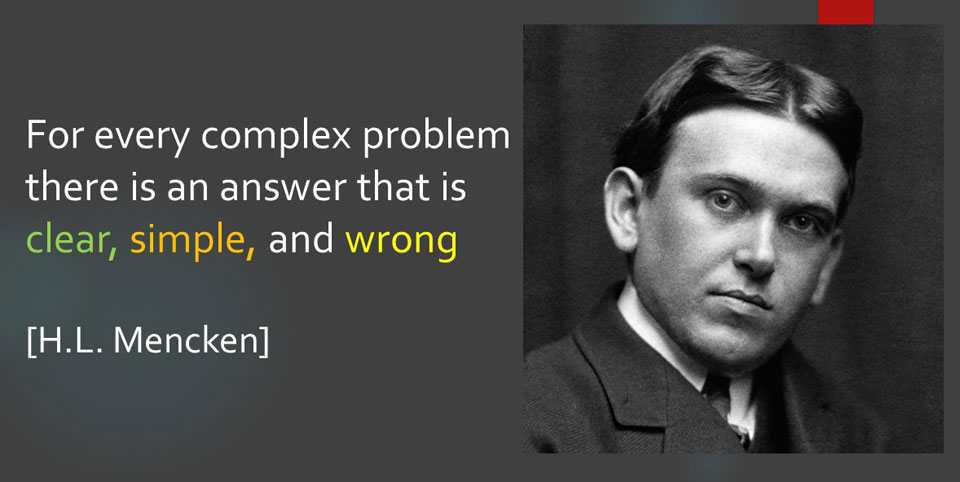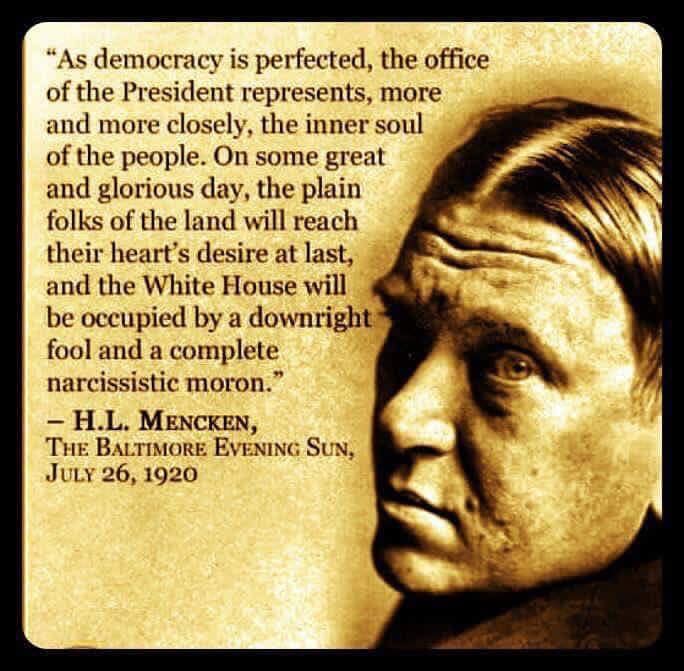
Trump Calls Media "The True Enemy Of The People"
Alan: There is much discussion in the United States about principles.
The apparent underpinning of this all-American appeal to principle is that sufficiently pure principles will save us from evil and ensure emergence of perfection.
Prima facie evidence of this perfectionistic tendency is the simplistic belief that "the invisible hand of the marketplace" automatically accomplishes "the best of all possible socio economic worlds" without need for the deliberate development of virtue or wisdom; indeed without need for any human intervention.
Just "get out of the way" and "the invisible hand" will accomplish every conceivable good.
"Simplicity" and "automaticity" are essential features of the American "heresy."
In the following passages, Thomas Merton and H.L. Mencken spotlight the dire, if not deadly, shortcomings of "simplicity" and "automaticity."
"The terrible thing about our time is precisely the ease with which theories can be put into practice. The more perfect, the more idealistic the theories, the more dreadful is their realization. We are at last beginning to rediscover what perhaps men knew better in very ancient times, in primitive times before utopias were thought of: that liberty is bound up with imperfection, and that limitations, imperfections, errors are not only unavoidable but also salutary. The best is not the ideal. Where what is theoretically best is imposed on everyone as the norm, then there is no longer any room even to be good. The best, imposed as a norm, becomes evil.”
"Conjectures of a Guilty Bystander,” by Trappist monk, Father Thomas Merton

Which brings us to "The Fairness Doctrine," an evidently imperfect mechanism which hindsight reveals as immeasurably better than the espistemological licenstiousness that followed.
Tryanny's Best Kept Secret: It's ALL About Epistemology
http://paxonbothhouses.blogspo
This licentiousness is still rampaging as irrespressibly as coronavirus and culminated in the Supreme Court's "Citizens United Decision" which issued the laughable judgment that "Corporations are persons" and therefore endowed with all rights and protections offered by The First Amendment.
Citizens United
Wikipedia
Excerpt: Five justices formed the majority and joined an opinion written by Justice Anthony Kennedy. The Court found that the BCRA §203 prohibition of all independent expenditures by corporations and unions violated the First Amendment's protection of free speech.[24] The majority wrote, "If the First Amendment has any force, it prohibits Congress from fining or jailing citizens, or associations of citizens, for simply engaging in political speech."[25]
The upshot of Citizens United is formal recognition that Big Money is entitled to purchase control of public opinion.
The cheek-by-jowl corollary of Citizens United is that once public opinion is allied with Big Money, the oligarchy that was subtly insinuated into the Constitution's core premise that a few people of property know better than the unpropertied masses, has given way to plutocracy, and, as night follows day, America is now ruled by kakistocrat Donald Trump.
"How Wealth Rules The World"
Ben G. Price

From the plutocratic point of view, the maraschino cherry atop this fetid mess is that "the masses" eagerly applaud their own oppression.
And so America has morphed from a time when a useful-but-imperfect order prevailed in "the media space" -- and in politics at large -- to the chaos that now prevails, and from which we are unlikely to emerge, if only because Plato and Aristotle's well-analyzed "life cycle" (kyklos) of governmental forms observes that democracy gives way to oligarchic tyranny. https://en.wikipedia.org/wiki/Kyklos

Aug 23, 2011 - First instituted in 1949, the Fairness Doctrine was a policy that required holders of broadcast licenses to discuss issues that were important to the ...
Jan 1, 2005 - The Fairness Doctrine had two basic elements: It required broadcasters to devote some of their airtime to discussing controversial matters of ...



No comments:
Post a Comment